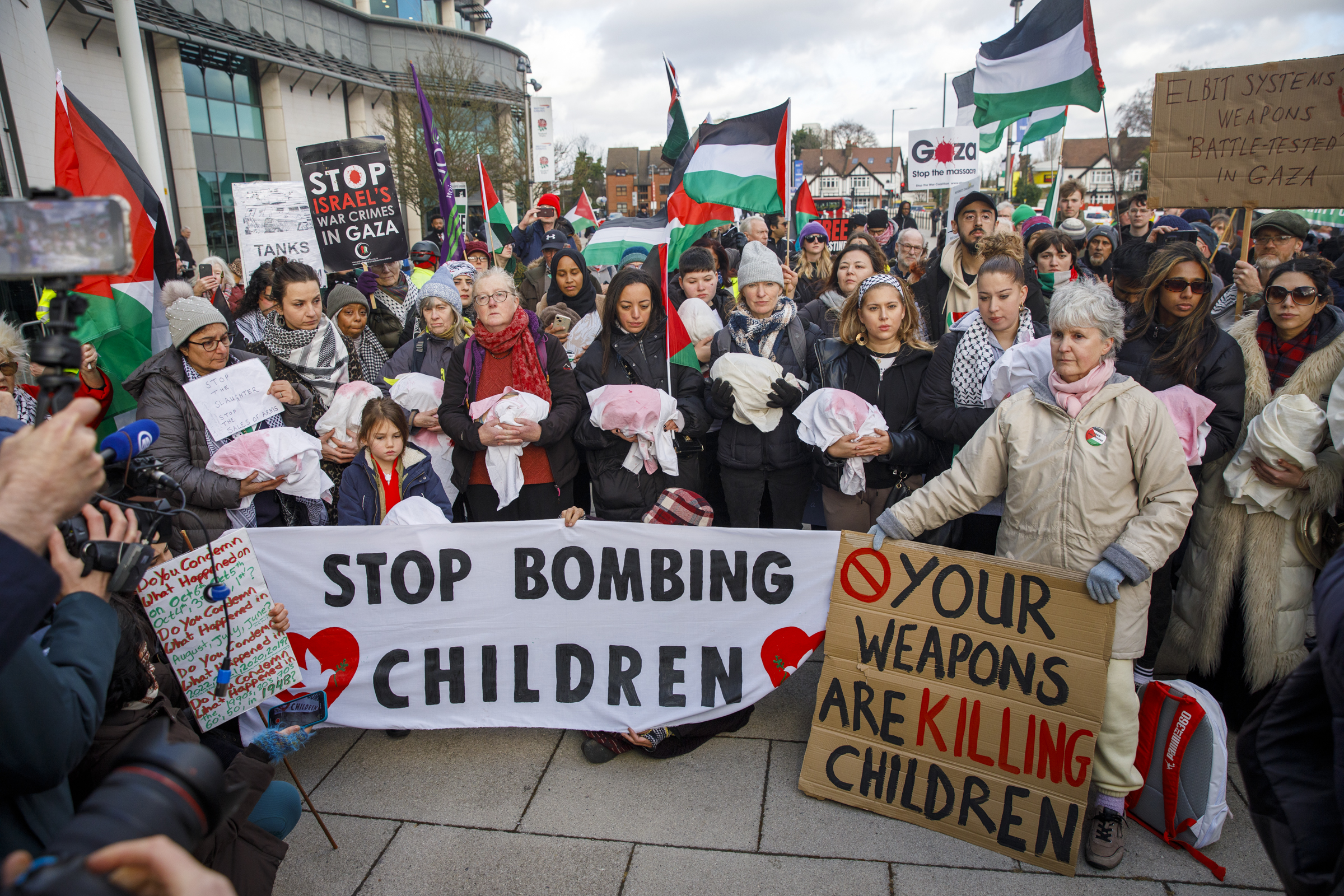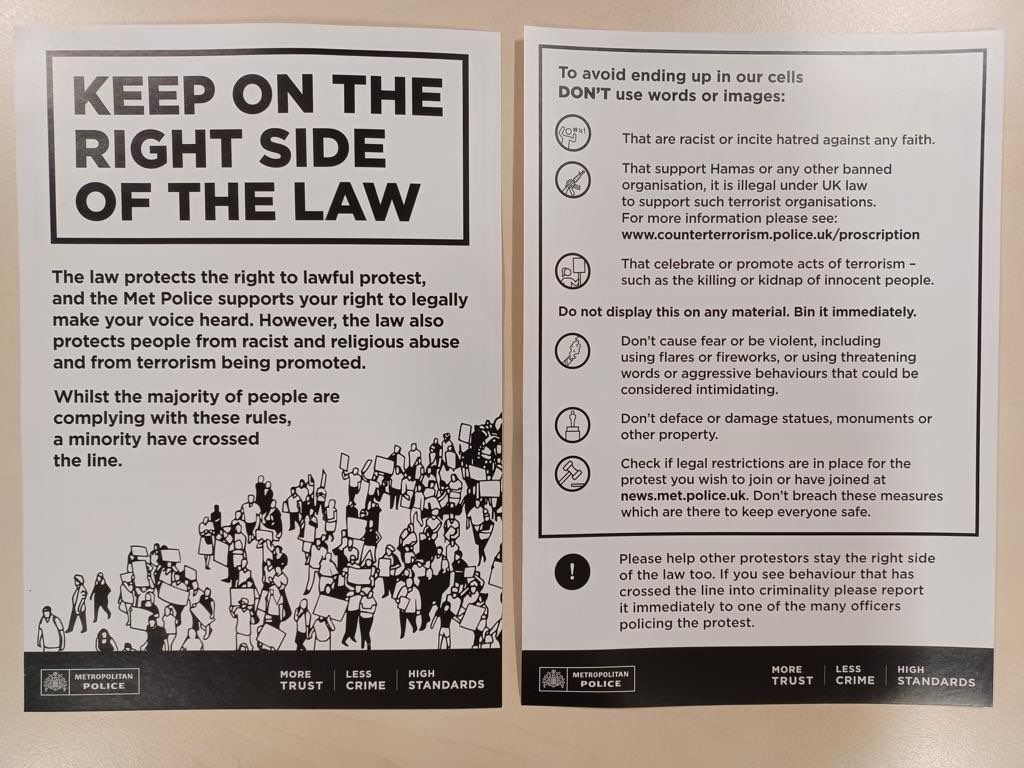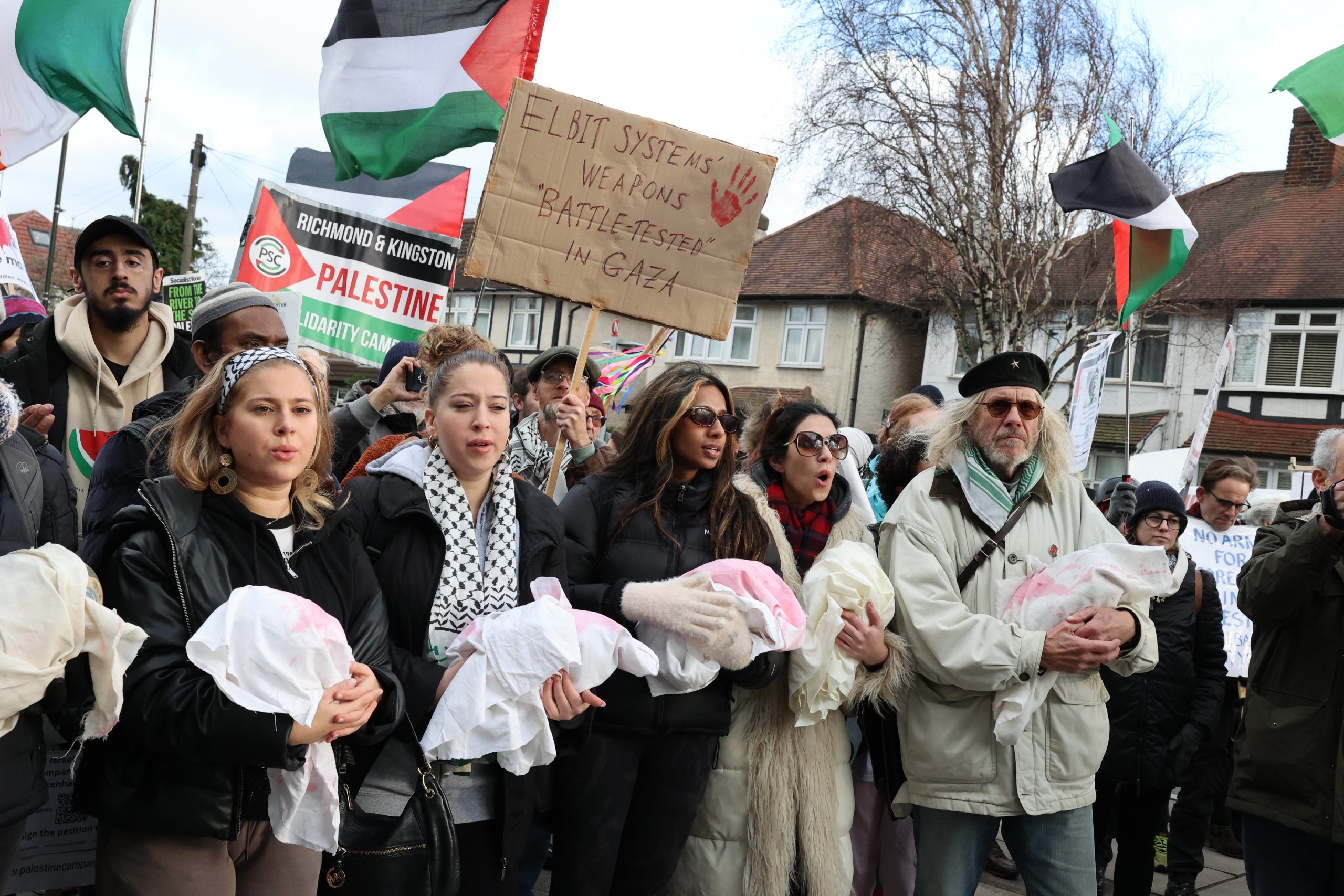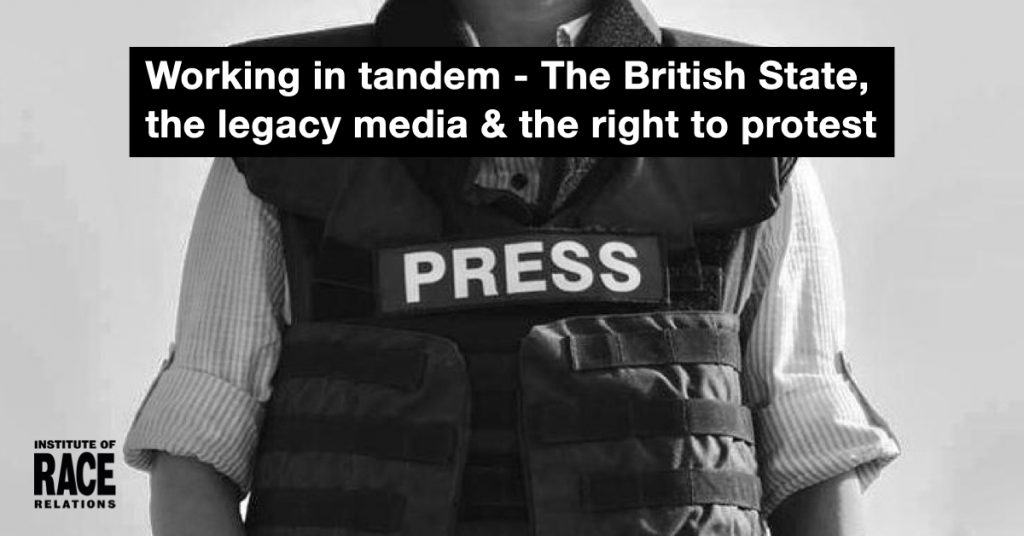Palestinian journalists in Gaza, travelling on foot, living in tents and with little access to food and water, have shown monumental courage and commitment to their profession. They have carried on working even as family members are killed, and they have risked their lives to expose Israeli atrocities. According to the Palestinian Journalists Syndicate, 102 Palestinian journalists and other media workers were killed in Gaza in 2023, with a further 23 media professionals seriously injured in the enclave, and 58 journalists arrested in the West Bank and Gaza since 7 October. In addition, Palestinian press and media institutions, targeted by Israeli bombing, have been totally or partially destroyed.
The comparison with some British media outlets, reporting from the comfort of news desks thousands of miles from the battle zone, could not be starker. They have been justly criticised, not least by the NUJ and others from within their own ranks, for decontextualising the war, failing to be clear about sources, skewing coverage to Israeli narratives, using inflammatory language and subjecting Palestinians who have lost family members in the conflict to the most crass questioning imaginable.

But some journalists, linked in particular to legacy media such as the Times, Telegraph, Daily Mail, Daily Express and Jewish Chronicle, have gone further, taking on the role of policing public order by acting as arbiters of who has and who does not have the right to protest in the UK. With pro-Palestinian voices presented as guilty by association with the actions of Hamas, the media’s policing of pro-Palestine sentiment has also taken the form of a McCarthyite witch hunt against academics, artists, cultural workers and sportspeople who speak out against the Israeli state’s genocidal campaign in Gaza or have otherwise supported the Palestinian cause. Anyone who points out that Israel is an apartheid state built on settler colonialism draws particular ire, with the implication that viewing the struggle for Palestine as an anti-colonial fight is to stand on the side of Hamas, a proscribed organisation in the UK.
Not the ‘fourth estate’ but a branch of government
One might argue that today the media, far from representing the ‘fourth estate’ of democracy, has become a branch of government, just a telephone call away from ministers, or so it might seem. While this is most starkly seen in the role the media have played in supporting government foreign policy in the Middle East, my focus in what follows is the role the media is playing in the repression of pro-Palestinian sentiment at home.
Given the inconvenient fact that the vast majority of the public support a ceasefire in Gaza, media outlets, through the frameworks and interviewing techniques they adopt, have substituted themselves for the public, presenting themselves as the voice of the ‘common people’. They are attempting to conjure up the illusion that the Israeli Defence Force’s actions are supported by the ‘silent majority’ of the British people. In the process – and in ways that echo the pronouncements of the former home secretary Suella Braverman and prime minister Rishi Sunak – pro-Palestinian demonstrators are portrayed as at best, a disruptive force and a public nuisance and, at worst, supporters of Hamas and the instigators of antisemitic ‘hate rallies’ that are an affront to British values (see Daily Express headline ‘HATE MARCHES’ ARE AN AFFRONT TO BRITISH VALUES: PM WANTS PROTESTS ON ARMISTICE DAY BANNED).
Going undercover
Some media outlets seem to think the cause of investigative journalism is best served by journalists going undercover, mingling with pro-Palestine demonstrators, recording their conversations or taking on assumed identifies online in chat groups, with a mind to encouraging the police and the CPS to prosecute. The Jewish Chronicle, easily outraged, claimed that ‘thousands of children’ were ‘bunking off school’ to ‘attend anti-Israel protests’. It went on to infiltrate a Schools Strike for Palestine Whatsapp group, passing on information about an organiser who they said ‘glorified Hamas’, to the Department for Education which then apparently referred the alleged offender to the police. (It’s worth pointing out here, that the Jewish Chronicle has a track record of making incendiary claims, such as those made against Dr Nimer Sultany, a Palestinian citizen of Israel and reader in Public Law at SOAS, which they apologised for, but only three months after defaming him.) In another case, Daily Express journalist Max Parry infiltrated Palestine Action, passing on information to the police which then launched prosecutions against five activists planning a direct action to expose the London Stock Exchange’s role in the Israeli weapons trade. The activists have since been charged with ‘conspiracy to commit public nuisance’.

Creating an exaggerated sense of threat, sidelining the legal process
The way that key journalists trail government policy proposals to restrict the right to protest and to extend definitions of extremism to further criminalise pro-Palestine sentiment, is another key indicator that much of legacy media today serve as a branch of government. It doesn’t matter if the policy changes proposed – many of which would surely be struck down in the courts – never actually happen. The purpose of government leaks to the media is not so much to create public support for authoritarian laws and instruments (an authoritarian government by its very nature bypasses the public) but to whip up fear, create an exaggerated sense of threat and ultimately impair and sideline the legal process. This then legitimises the current police strategy of using Section 12 (1A) of the Terrorism Act 2000, (which criminalises the expression of opinions supportive of a banned organisation), against prominent Palestine solidarity activists, as well as section 12 and 14 of the 1986 Public Order Act (as amended by the Police, Crime, Sentencing and Courts Act) to harry the organisers of demonstrations by placing an ever-expanding number of conditions, particularly in relation to route and timing, and penalties against them. The threat of so-called Henry VIII powers which have enabled the government to impose further restrictions on the right to protest via minimally scrutinised secondary legislation, also looms large. This includes the ability to take into account the ‘cumulative effect of repeated demonstrations’, with obvious implications for the weekly national protests that have taken place for three months now calling for an end to the genocide and an immediate and lasting ceasefire
A carefully calibrated strategy to harry organisers
Rather than outright bans, that can be challenged in the courts, what this entails is a subtler process based on a gradually applied strategy that takes the form of a carefully calibrated attempt by the police to harry and neutralise prominent Palestine solidarity organisers. A case in point is that of Scottish PSC founder Mike Napier, who was arrested during an anti-genocide protest at Glasgow Central Station. He was subsequently charged with support for a proscribed organisation (under section 12 of the Terrorism Act 2000) in relation to comments he made in a speech earlier that day (to the effect that Palestinians had a right to resist occupation, interpreted by the police as support for Hamas). He was subjected to repressive bail conditions, including a ban on attending any protest anywhere in Scotland. In fact, at the Glasgow Sheriff’s Court the prosecutor fiscal dropped the charges, while applying to continue the bail conditions, irrespective of the dropping of the charges – an application thrown out by the Sheriff. Nevertheless, the period from arrest to being brought to court lasted over a month, during which Napier was effectively demobilised.
Establishing new norms on ‘hate speech’
The British police are riddled with racism, and over the last few years there has been scandal after scandal involving police private chat groups where the most extreme racist, sexist and offensive comments are shared. One might ask on what basis, given the Met’s track record and their failure to put their own house in order, they can adjudicate between communities on what constitutes hate speech. And yet, in another sign of our Orwellian times, the Met have targeted pro-Palestinian events for aggressive and expensive surveillance on the grounds that a handful of the tens of thousands attending the demonstrations may harbour antisemitic prejudices and, on occasion, may place them on public display. Intense retrospective trawling of images of demonstrators, and social media posts, are undertaken to track down individuals suspected of public order offences such as the carrying of placards that, in failing to distinguish between the actions of Israel and Jews, are clearly antisemitic and prosecutable. But the actions of a tiny number of individuals are then superimposed on the demonstration as a whole and used to collectively smear the organisers. In this way the police, through their retrospective actions, provide ballast for the legacy media’s persistent claims – made with no evidence whatsoever – that these rallies are not aimed at stopping a genocide carried out by a particular nation – Israel – but an anti-Israel rally which is intrinsically antisemitic and should not be allowed.
So, in an unprecedented move and a clear attempt to stigmatise, the Met even circulated a ‘Hate Crime Protest Leaflet’ at a national ceasefire demonstration in London, warning participants (including presumably the large Jewish bloc) that if they should use words that ‘are racist or incite hatred against any faith’, ‘support Hamas or any other banned organisation’, or ‘celebrate or promote acts of terrorism’ they would be prosecuted. A total of seven arrests were apparently made at the time of this demonstration. Furthermore, thanks to Open Democracy’s analysis of data from Operation Brocks (the Met’s ‘response to the ongoing conflict in Israel and Gaza and its impact on London’ ) we now know that there were only 153 arrests, on weekly pro-Palestine protests from October-December 2023, with the majority of people, 117, being released without charge. (36 charges in all).

But the volume of police resources given over to the retrospective pursuit of hate crime at demonstrations organised to advance anti-racism (after all genocide is defined as targeted action aimed at the destruction of particular groups of people) is not the point. The smearing and stigmatising of the demonstrations as antisemitic in intent and posing a threat to the Jewish community, which is the real aim, could only be achieved with the assistance of the media, with headlines such as the Mail’s ‘PALESTINE PROTESTERS DEFY HATE SPEECH WARNINGS WITH ANTI-SEMITIC BANNERS’.
‘From the river to the sea’
Journalists, following the lead of politicians Sunak and Braverman, have even gone so far as to harry the police and the CPS into more repression, with the chanting on pro-Palestinian demonstrations of the slogan ‘from the river to the sea, Palestine will be free’ emerging as this group’s casus belli. For the ‘liberal’ Guardianthis expression of support for the Palestinian cause is ‘controversial’; the Daily Mail is more forthright in labelling it hate speech; while the current Metropolitan police position, which stresses context, and cannot be objected to, states rationally that its use is not an ‘arrestable offence’ in a protest situation, though it could be if used to intimidate or harass Jewish people in a non-protest context.
But for all those who care about the fate of the Palestinian people, and who defend freedom of expression, the defence of the right to chant the ‘from the river to the sea’ slogan on demonstrations has emerged as the matter of the moment. For the slogan, far from being controversial, reaffirms the right of return, the liberation of Palestine and the freedom of the Palestinian people. And as the European Legal Support Centre has pointed out, ‘the strategy behind portraying this slogan as hate speech is to equate antisemitism with antizionism’ and ‘silence discussion around and advocacy for the Palestinian cause’.
For some leader writers, headline writers and journalists, as well as Jewish communal leaders from the Board of Jewish Deputies, the Jewish Leadership Council and the Community Security Trust, ‘from the river to sea’ is not protected speech but should be treated as a criminal offence, an incitement to violence against Jews. Once again, the right to resist Israeli occupation is deemed illegitimate, even though it is supported by international law. Suffice to say no successful prosecution has ever been brought in the UK against anyone using this chant, and if the right-wing media is to get its way, it will necessitate a change to the law. While the Metropolitan police have to date resisted pressure from politicians and the media to make arrests relating to ‘from the river to the sea’, this opposition may be short-lived given the Met police commissioner’s support for a review of the ‘legal definition of extremism and how it should be policed’.
Here, though, the CPS and the Met may also be mindful of developments in other European countries, where judges have come down on the side of freedom of expression.
While the media-stoked climate in Germany in respect of solidarity with Palestine is probably the most repressive in Europe, courts in Munster and Cologne have defied the current political/media consensus, ruling that, in principle, the chant is not punishable because, according to the understanding of an unbiased and understanding audience, it ‘objectively does not have any criminal interpretations’. And the Dutch public prosecutor has argued that pro-Palestinian slogans ‘are subject to various interpretations’ and that while they may ‘relate to the state of Israel’ they do not relate to Jews because of their race or religion.
But here again, the purpose of the British political and media preoccupation with ‘from the river to the sea’ is not really to carry out mass arrests at demonstrations (which would massively increase the risk of disorder), but to create new norms and, by whipping up fear, strengthen the existing climate of self-censorship and exclusion. The Labour party, for one, has duly complied with this reactionary anti-Palestine consensus, suspending Andy McDonald, MP for Middlesborough, after he said at a rally, ‘We won’t rest until we have justice, until all people, Israelis and Palestinians, between the river and the sea can live in peaceful liberty’.
What is particularly disturbing is the way the climate generated by politicians and journalists has now spread to the courts where, in at least one case, we have seen counsel for those accused of racially-aggravated offences, using the offence caused by the ‘from the river to the sea’ slogan in mitigation. When two men were brought before a magistrates’ court for an incident on Armistice Day during which pro-Palestine demonstrators travelling on the train were called terrorists and told to ‘go back to their own country’, their defence attempted to situate the men’s ‘inexcusable behaviour’ as a knee-jerk response to provocation caused by protesters who chant ‘from the river to the sea’.
Paying the costs of policing
There are many other examples of the way politicians and media, working together, are attempting to create new norms. Take, for example, the ‘Walney report’ submitted to the Home Office last December, with its proposal to force the organisers of ‘persistent protests which are disruptive and involve law-breaking’ to contribute to the cost of their policing. While a report submitted to the Home Office by the grandly titled Independent Advisor on Political Violence and Disruption (a post created by Boris Johnson) is still under wraps, its proposals have been shared with the Telegraph, which ran the story under the headline ‘PALESTINE PROTEST ORGANISERS SHOULD ‘PAY FOR POLICING’. It cited Lord Walney’s claim that there have been ‘repeated incitements and disorder’ at ‘anti-Israel’ protests since October and quoted him to the effect that the pro-Palestine marches are a ‘drumbeat’ that places strain on ‘overstretched police forces’ and a ‘sense of fear’ in the Jewish community. Another of Walney’s proposals reported by the Telegraph is to ban the use of face masks on demonstrations.
It’s on the streets, not in the press, where international law is defended
Once again, British politicians and their partners in the media are out of step with public opinion, just as they are out of step with international law which explicitly recognises the right to resist occupation or subjugation – in the UN Charter and many UN General Assembly Resolutions, and with the UN Security Council resolutions from 1967 onwards calling for the withdrawal of Israeli’s armed forces from Occupied Territories. The obvious conclusion of this disjuncture is that it is the organisers of the Stop the Genocide/Ceasefire protests who are the ones upholding international law. And this is the final reason why it is essential that pro-Palestinian protests are not forced off the streets, in Britain, France or Germany, or indeed anywhere in the world. For as four UN Special Rapporteurs have pointed out the worldwide climate of criminalisation and sanctions against those speaking out on Gaza/Israel stifles free expression and creates an atmosphere where people may fear participating in public life, ‘particularly when solidarity with victims is equated with support for terrorism or antisemitism’.


